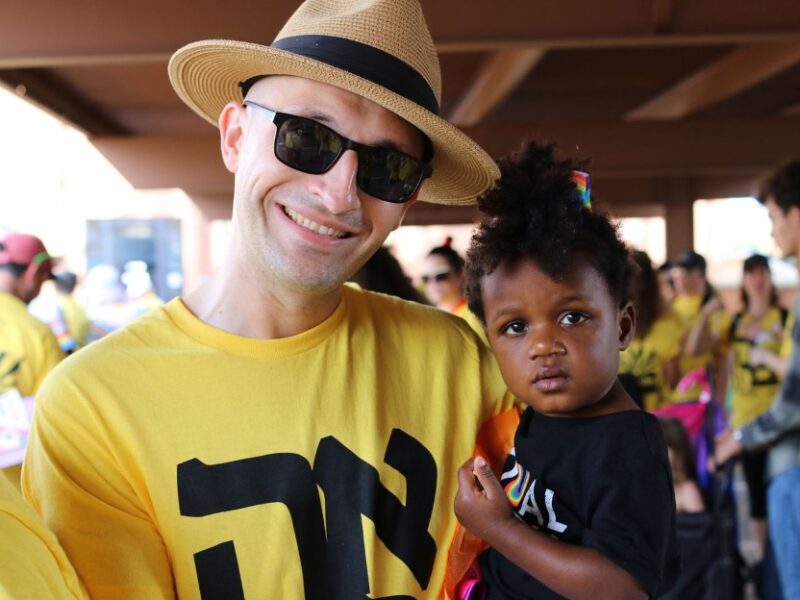There was a backpack with wires hanging out of it in the pickup area of Los Angeles International Airport. I looked to see if I could spot the owner of the bag, but no one was in sight. I immediately alerted a policeman who shrugged his shoulders and said he would investigate. I couldn’t help but notice he looked completely uninterested and acted as if it was no big deal.
I started to think of all the commercials I had seen on television as a kid spending my summers in Israel. They urged you to alert authorities and leave the area quickly if you saw a suspicious or unidentified bag or package. I moved away from the bag, and thought, “There is no way in Israel or any Jewish establishment worldwide this situation would be taken lightly.” Generally speaking, since Sept. 11, 2001, security situations in America are taken more seriously.
John Pennington, former director of FEMA’s Region X (Alaska, Idaho, Oregon and Washington) and a member of the Emergency Management Institute Adjunct Faculty, explained how important it is for all Americans to be diligent. “Foremost, people need to constantly be aware of their surroundings – not to the point of paranoia, just a very heightened awareness of what is happening around them. Americans are instinctually action-oriented, if we are not caught off-guard. I have tremendous faith in the individual and community to rise when called upon, to say aloud to anyone and everyone that will listen, ‘Something is not right here.’ There is a reason that DHS and the federal government engaged in the slogan ‘See something, say something.’
It resonates. If that slogan were truly ingrained into our individual psyche, we will win the homeland security war much quicker.” Many Americans who are Jewish or Israeli have a great understanding of persecution and of terrorism, in light of historical events such as the Holocaust, the murder of Israeli athletes at the Munich Olympics and the current threat to the State of Israel. History has taught us to be more aware and more diligent in security issues.
Israeli security expert Alex Lev, a former fighter pilot, explained: “Security is important to all people regardless of nationality. All people want security, whether it being financial, personal (safe roads, safe homes, protection against armed robberies, safe schools etc.). Israelis all want security as much as any American does with one additional and very different aspect. We have the lesson of the Holocaust in our collective memory. The effect it has and the lesson learned is that in order to be in a position to avoid history repeating itself, the state of Israel pro vides a possible solution for any persecution of Jews anywhere in the world.”
Worldwide, Jewish people take extra security measures. For instance, The Great Synagogue in Rome has had its share of good and bad times. After a Simchat Torah celebration in 1982, there was a terrorist attack in which 45 people were injured and a 2-year-old child was killed. After the attack, the Italian government implemented the current security measures of armed police officers who stand guard.
Amy Heyman, an American living in Rome, explained, “Usually, when one enters a synagogue, a Jewish school or a Jewish center, even for a regular Shabbat service, somebody checks bags or purses. First they look at you to see if they know you, and if not, they ask you who you are. Arriving with kids helps a little bit. In Italy the Jews are very concerned about security: everybody remembers the (Palestinian) attack in September 1982.” Since the birth of Israel, the country has always been attacked in a variety of ways. This has made people more aware and forces them to notice their surroundings.
Alex Lev explained, “Israelis are trained to notice details such as who gets on the bus and what is he carrying. Things such as did he leave any baggage lying around unattended? Perhaps the question is why is this guy wearing a heavy coat in the middle of an Israeli summer? “Many people know when driving in the south or living in the south (only an hour from Tel Aviv) to keep the radio on and listen for the ‘Red Color’ code and know the security drill, where one needs to look for the nearest secure spot, shelter or ditch.”
A heightened sense of security has always been a concern for Jewish people worldwide; therefore, most Jewish institutions have additional security in place. However, terrorism in America has brought the issue to the forefront: Everyone needs to take notice of his or her surroundings. Pennington explained, “We all ‘own’ the homeland security responsibility. This issue is no longer something that we can simply pay taxes for (as individuals) and expect the president and Congress to manage. The proverbial role and responsibility fo engaging in homeland security belongs to our government structures, communities, our many cultures, families and individuals.
Everyone has a role. Denying that we each have a responsibility contributes to potential failure … and that is not an option.”
Masada Siegel is an international correspondent who writes for The New York Times, The International Herald Tribune, The San Francisco Chronicle, Newsweek/The Daily Beast, The Jerusalem Post, The Toronto Star , SKI Magazine and about 40 other publications around the United States, Canada and the UK. She has traveled to more than 40 countries, often solo. She has spent about two years in Israel over the course of 18 visits of various durations. She is a consultant for Homeland
Security. For more information, visit masadasiegel.com.





